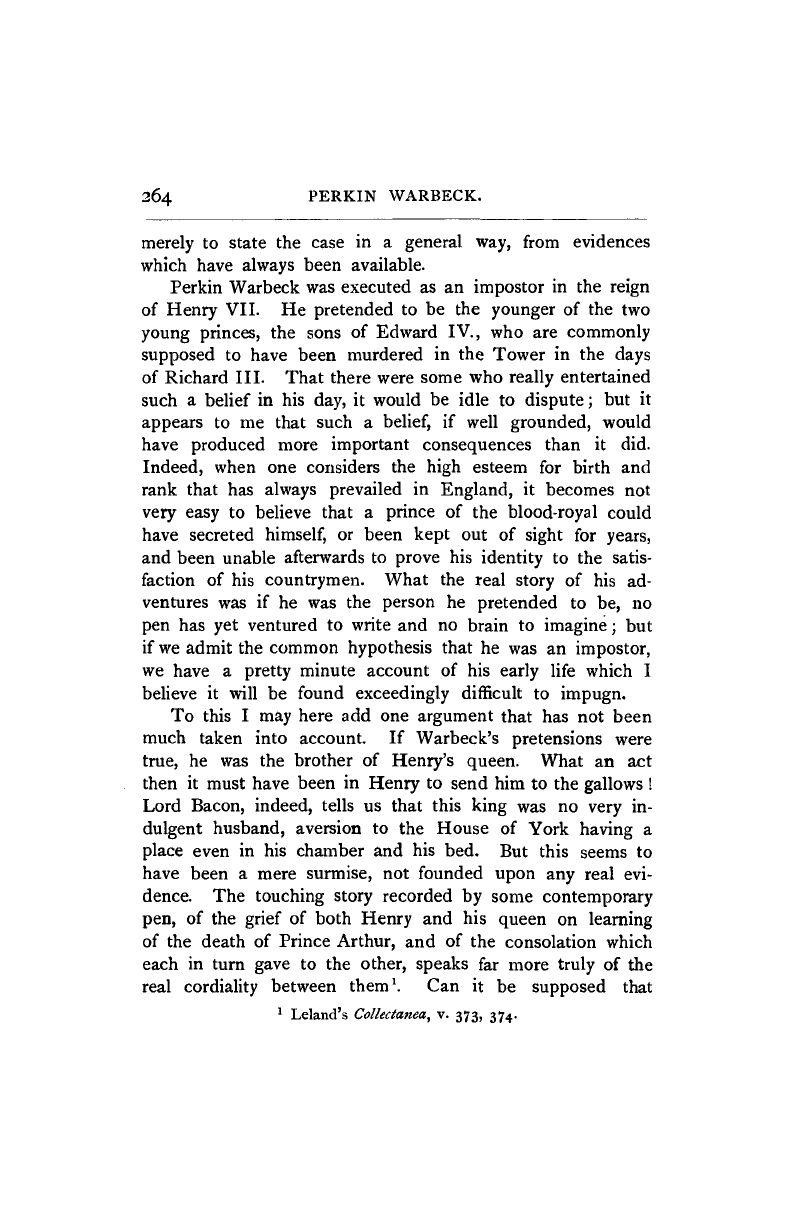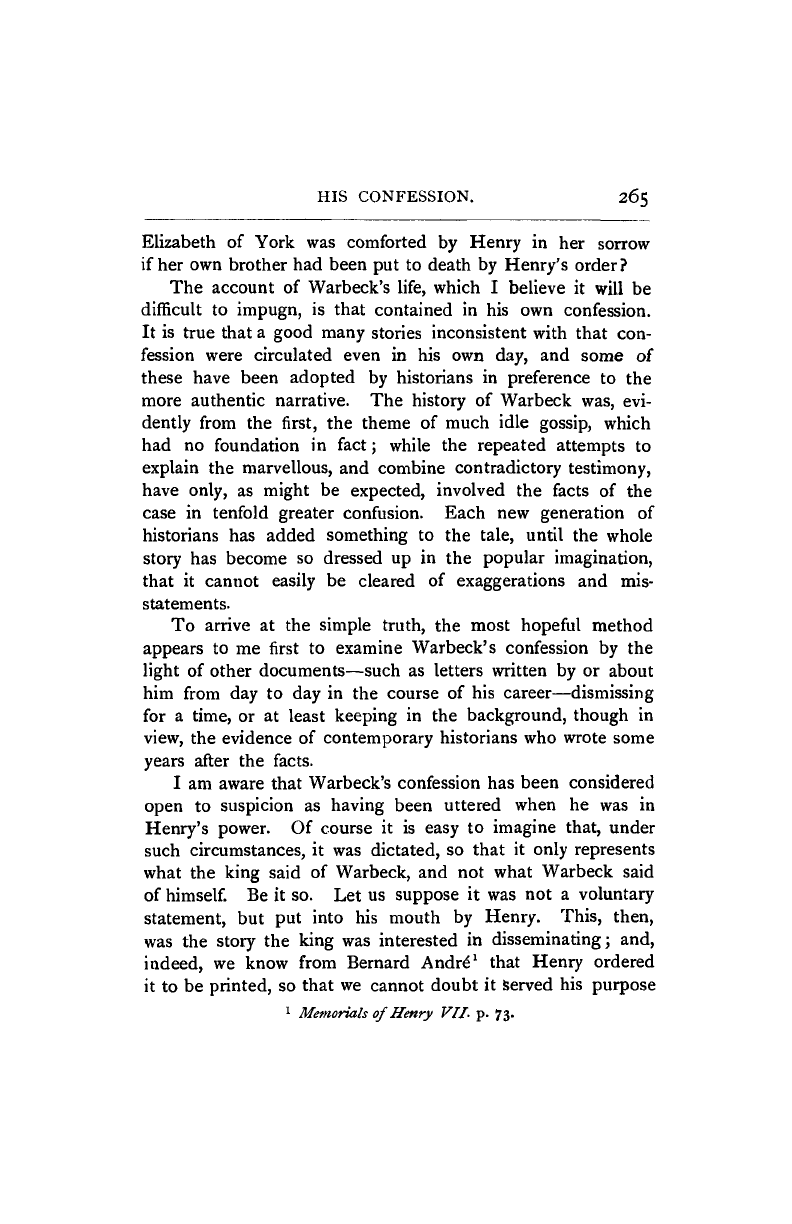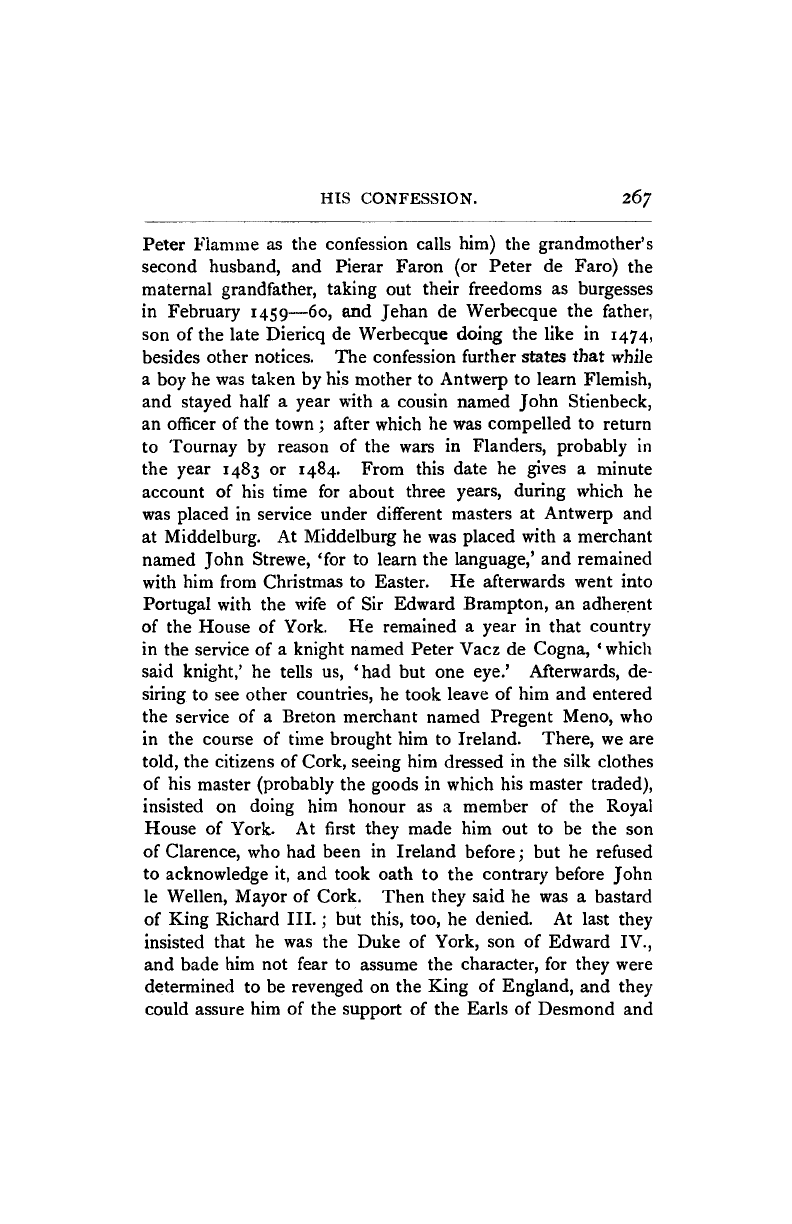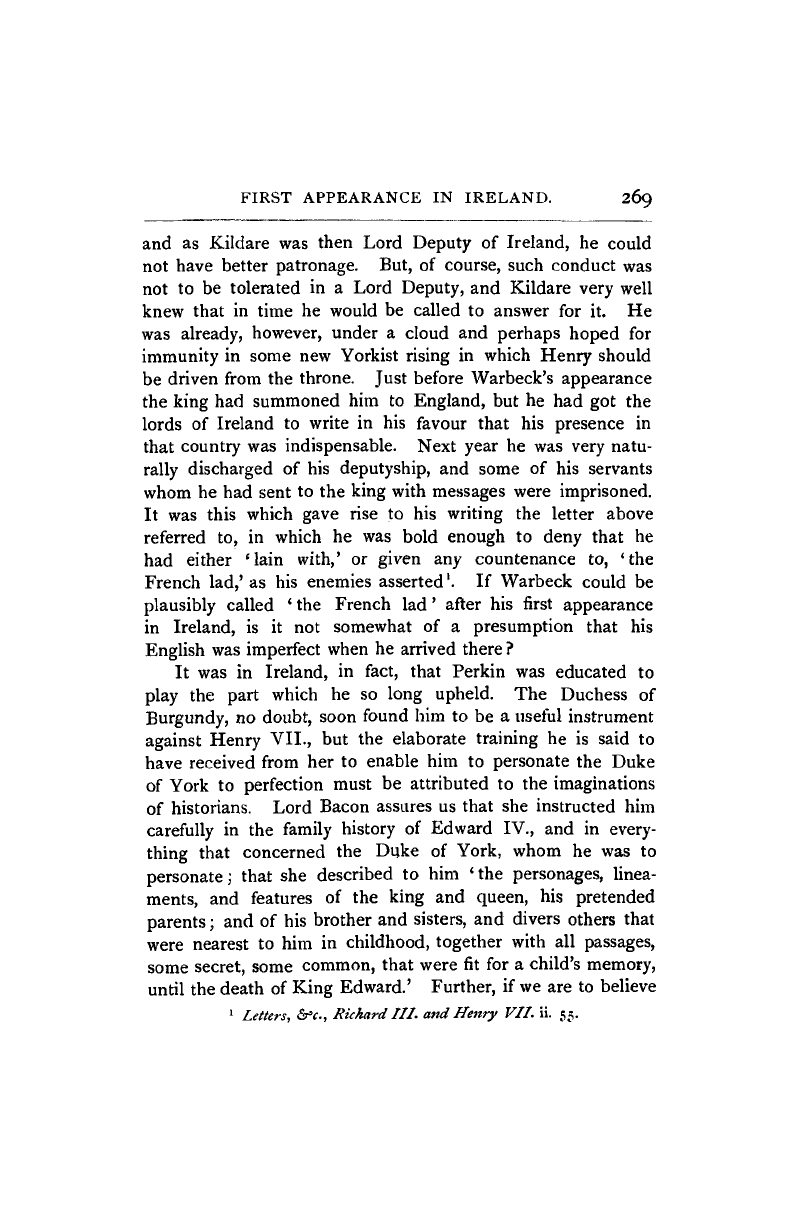Gairdner J. History of the Life and Reign of Richard the Third: To which is Added the Story of Perkin Warbeck from Original Documents
Подождите немного. Документ загружается.



THE STORY
OF
PERKIN WARBECK
FROM ORIGINAL DOCUMENTS


THE STORY OF PERKIN WARBECK
FROM ORIGINAL DOCUMENTS.
THE
career of Perkin Warbeck, whatever may be thought
of his pretensions, was certainly in itself so extraordinary that
it is no wonder it gave rise, even from the first, to a good
many strange and inconsistent statements; and it is a mis-
fortune for English history that the student's chief guide
hitherto has been a mere summary of the case, written, of
course, with great vigour and clearness, but highly coloured
and from very imperfect information, by the great Lord Bacon
in his History of Henry the Seventh. Lord Bacon, indeed,
discredits the pretensions of the adventurer as most other
writers do; but he is clearly smitten with the love of the
marvellous, and, as we shall see, he considerably misinterprets
in some things the scanty records on which he founds his
narrative. But he really seems to have made use of all the
evidences available at the time he wrote; and as until our
own day there was very little more material by which to
form a judgment, historians have been generally content to
follow his guidance. It is the object of this paper, however,
to trace the career of Warbeck from contemporary documents,
most of which have been altogether unknown till the present
generation.
A few words, nevertheless, seem called for at the outset,

264 PERKIN WARBECK.
merely to state the case in a general way, from evidences
which have always been available.
Perkin Warbeck was executed as an impostor in the reign
of Henry VII. He pretended to be the younger of the two
young princes, the sons of Edward IV., who are commonly
supposed to have been murdered in the Tower in the days
of Richard III. That there were some who really entertained
such a belief in his day, it would be idle to dispute; but it
appears to me that such a
belief,
if well grounded, would
have produced more important consequences than it did.
Indeed, when one considers the high esteem for birth and
rank that has always prevailed in England, it becomes not
very easy to believe that a prince of the blood-royal could
have secreted
himself,
or been kept out of sight for years,
and been unable afterwards to prove his identity to the satis-
faction of his countrymen. What the real story of his ad-
ventures was if he was the person he pretended to be, no
pen has yet ventured to write and no brain to imagine; but
if we admit the common hypothesis that he was an impostor,
we have a pretty minute account of his early life which I
believe it will be found exceedingly difficult to impugn.
To this I may here add one argument that has not been
much taken into account. If Warbeck's pretensions were
true,
he was the brother of Henry's queen. What an act
then it must have been in Henry to send him to the gallows !
Lord Bacon, indeed, tells us that this king was no very in-
dulgent husband, aversion to the House of York having a
place even in his chamber and his bed. But this seems to
have been a mere surmise, not founded upon any real evi-
dence. The touching story recorded by some contemporary
pen, of the grief of both Henry and his queen on learning
of the death of Prince Arthur, and of the consolation which
each in turn gave to the other, speaks far more truly of the
real cordiality between them
1
. Can it be supposed that
1
Leland's
Collectanea,
v. 373, 374.

HIS CONFESSION. 265
Elizabeth of York was comforted by Henry in her sorrow
if her own brother had been put to death by Henry's order
?
The account of Warbeck's life, which I believe it will be
difficult to impugn, is that contained in his own confession.
It is true that a good many stories inconsistent with that con-
fession were circulated even in his own day, and some of
these have been adopted by historians in preference to the
more authentic narrative. The history of Warbeck was, evi-
dently from the first, the theme of much idle gossip, which
had no foundation in fact; while the repeated attempts to
explain the marvellous, and combine contradictory testimony,
have only, as might be expected, involved the facts of the
case in tenfold greater confusion. Each new generation of
historians has added something to the tale, until the whole
story has become so dressed up in the popular imagination,
that it cannot easily be cleared of exaggerations and mis-
statements.
To arrive at the simple truth, the most hopeful method
appears to me first to examine Warbeck's confession by the
light of other documents—such as letters written by or about
him from day to day in the course of his career—dismissing
for a time, or at least keeping in the background, though in
view, the evidence of contemporary historians who wrote some
years after the facts.
I am aware that Warbeck's confession has been considered
open to suspicion as having been uttered when he was in
Henry's power. Of course it is easy to imagine that, under
such circumstances, it was dictated, so that it only represents
what the king said of Warbeck, and not what Warbeck said
of
himself.
Be it so. Let us suppose it was not a voluntary
statement, but put into his mouth by Henry. This, then,
was the story the king was interested in disseminating; and,
indeed, we know from Bernard Andre"
1
that Henry ordered
it to be printed, so that we cannot doubt it served his purpose
1
Memorials
of Henry VII. p. 73.

266 PERKIN WARBECK.
to make it known. A printed document could not have failed
to be criticised at the time if there was any perversion of well-
known facts in it.
On the other hand, the minuteness of the particulars it
contained, •with its circumstantial statement of facts, of which
many persons then alive must have known the truth or false-
hood, is to my mind very strong evidence in its' favour. In
the first place, let it be remarked that Warbeck in this con-
fession speaks of both his parents in the present tense as
persons who were then alive and quite well known:—' My
father's name is John Osbeck—which said John Osbeck' (it
is added, perhaps by the chronicler, in a parenthesis) 'was
controller of the said town of Tournay;—and my mother's
name is Katharine de Faro.' Now, it so happens, as will
be seen in the course of this paper, that we have distinct
and separate testimony from other sources, on more than
one occasion during his career, to the fact of both Warbeck's
parents being then alive. Moreover, his birth and connections
were not altogether obscure; for the confession continues as
follows :—' And one of my grandsires upon my father's side
was named Diryck Osbeck, which died; after whose death
my grandmother was married unto the within-named Peter
Flamme that was receiver of the fore-named town of Tournay,
and dean of the boatmen that row upon the water or river
called Leschelde. And my grandsire upon my mother's side
was Peter de Faro, which had in his keeping the keys of the
gate of St John's within the same town of Tournay. Also
I had an uncle called Master John Stalyn dwelling in the
parish of St Pyas within the same town, which had married
my father's sister, whose name was Joan or Jane, with whom
I dwelled a certain season.' On the face of matters it is surely
very improbable that the persons here mentioned were unreal;
but if anyone be disposed to think so, the extracts from the
municipal archives of Tournay cited at the end of this paper
will dispel his doubts; for there we have Pierart Flan (or

HIS CONFESSION. 267
Peter Flamme as the confession calls him) the grandmother's
second husband, and Pierar Faron (or Peter de Faro) the
maternal grandfather, taking out their freedoms as burgesses
in February 1459—60, and Jehan de Werbecque the father,
son of the late Diericq de Werbecque doing the like in 1474,
besides other notices. The confession further states that while
a boy he was taken by his mother to Antwerp to learn Flemish,
and stayed half a year with a cousin named John Stienbeck,
an officer of the town; after which he was compelled to return
to Tournay by reason of the wars in Flanders, probably in
the year 1483 or 1484. From this date he gives a minute
account of his time for about three years, during which he
was placed in service under different masters at Antwerp and
at Middelburg. At Middelburg he was placed with a merchant
named John Strewe, 'for to learn the language,' and remained
with him from Christmas to Easter. He afterwards went into
Portugal with the wife of Sir Edward Brampton, an adherent
of the House of York. He remained a year in that country
in the service of a knight named Peter Vacz de Cogna, ' which
said knight,' he tells us, 'had but one eye.' Afterwards, de-
siring to see other countries, he took leave of him and entered
the service of a Breton merchant named Pregent Meno, who
in the course of time brought him to Ireland. There, we are
told, the citizens of Cork, seeing him dressed in the silk clothes
of his master (probably the goods in which his master traded),
insisted on doing him honour as a member of the Royal
House of York. At first they made him out to be the son
of Clarence, who had been in Ireland before; but he refused
to acknowledge it, and took oath to the contrary before John
le Wellen, Mayor of Cork. Then they said he was a bastard
of King Richard III.; but this, too, he denied. At last they
insisted that he was the Duke of York, son of Edward IV.,
and bade him not fear to assume the character, for they were
determined to be revenged on the King of England, and they
could assure him of the support of the Earls of Desmond and

268 PERKIN WARBECK.
Kildare. ' And so,' adds Perkin, ' against my will they made
me to learn English, and taught me what I should do and
say.'
Such is the story of Warbeck's early life as contained in
the confession. Walpole urges, as one objection to it, that
it makes him learn English twice over. But even if English
was the language which he was sent to learn at Middelburg
(though that is not quite clear) he could hardly have acquired
it to perfection between Christmas and Easter, when he was
in the service of John Strewe. He was probably then about
ten or eleven years old
1
, and though doubtless an apt scholar,
would naturally have required a little further teaching after
being a year in Portugal, even if there were no intermediate
wanderings, as I think there must have been. In this, there-
fore,
as in other things, notwithstanding Walpole's objections,
the confession appears to me to be thoroughly consistent, not
only, with
itself,
but with all the best sources of information
that we possess. In fact, it agrees with some other evidences
remarkably well. For Perkin, be it observed, first appeared
in Ireland in 1491, a youth of about seventeen, and whatever
acquaintance with English he had made six or seven years
before would naturally require to be improved. And it is
worth noting how the Earl of Kildare refers to him in a letter
written in February 1493. Kildare, there can be no doubt,
had encouraged his pretensions in 1491. He
himself,
as we
have seen, says in his confession that it was by the assurance
of support from the Earls of Kildare and Desmond that he
was emboldened to assume the character of Duke of York;
1
It appears from evidence cited by Sir Fred. Madden (Arc/ueol. xxvii.
161) that the Duke of York was bora on the 17th August, 1472. Warbeck,
however, supposed the character he was personating to have been not quite
nine years old in 1483; which, we may presume, nearly tallied with his
own age. Moreover the Venetian ambassador who saw him in London in
1497 says that he was then 23 (Venetian Calendar, vol. i. No. 760). So
that he seems to have been born in 1474.

FIRST APPEARANCE IN IRELAND. 269
and as Kildare was then Lord Deputy of Ireland, he could
not have better patronage. But, of course, such conduct was
not to be tolerated in a Lord Deputy, and Kildare very well
knew that in time he would be called to answer for it. He
was already, however, under a cloud and perhaps hoped for
immunity in some new Yorkist rising in which Henry should
be driven from the throne. Just before Warbeck's appearance
the king had summoned him to England, but he had got the
lords of Ireland to write in his favour that his presence in
that country was indispensable. Next year he was very natu-
rally discharged of his deputyship, and some of his servants
whom he had sent to the king with messages were imprisoned.
It was this which gave rise to his writing the letter above
referred to, in which he was bold enough to deny that he
had either 'lain with,' or given any countenance to, 'the
French lad,' as his enemies asserted'. If Warbeck could be
plausibly called ' the French lad' after his first appearance
in Ireland, is it not somewhat of a presumption that his
English was imperfect when he arrived there
?
It was in Ireland, in fact, that Perkin was educated to
play the part which he so long upheld. The Duchess of
Burgundy, no doubt, soon found him to be a useful instrument
against Henry VII., but the elaborate training he is said to
have received from her to enable him to personate the Duke
of York to perfection must be attributed to the imaginations
of historians. Lord Bacon assures us that she instructed him
carefully in the family history of Edward IV., and in every-
thing that concerned the Duke of York, whom he was to
personate; that she described to him ' the personages, linea-
ments, and features of the king and queen, his pretended
parents; and of his brother and sisters, and divers others that
were nearest to him in childhood, together with all passages,
some secret, some common, that were fit for a child's memory,
until the death of King Edward.' Further, if we are to believe
1
Letters,
&c,
Richard
HI. and Henry VII. ii. 55.
